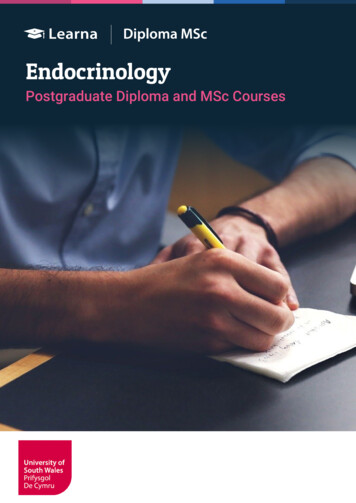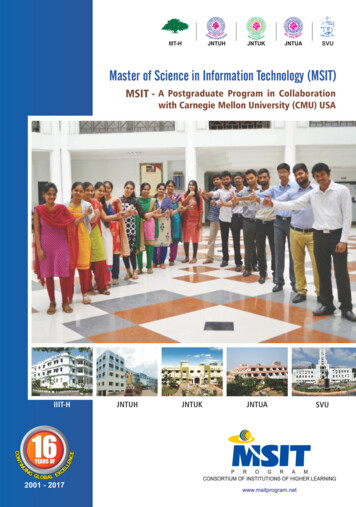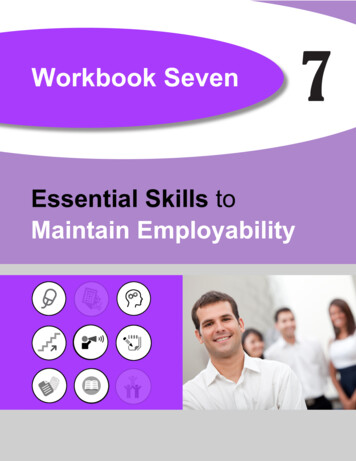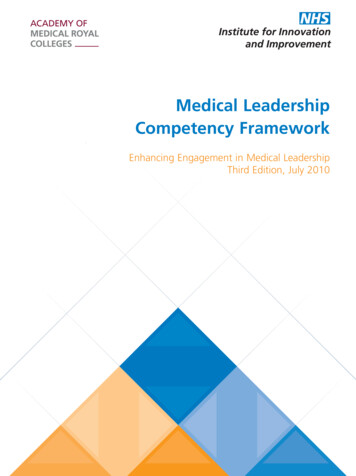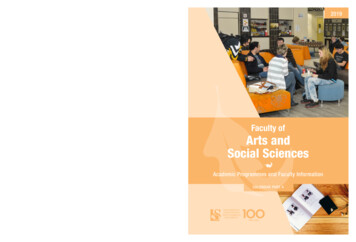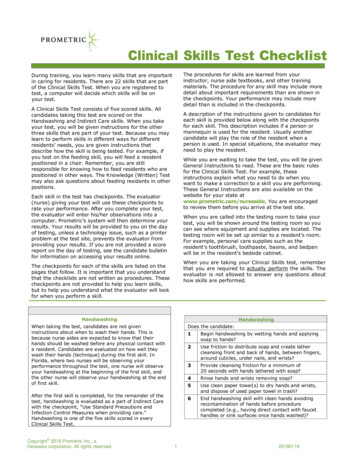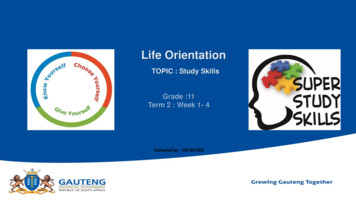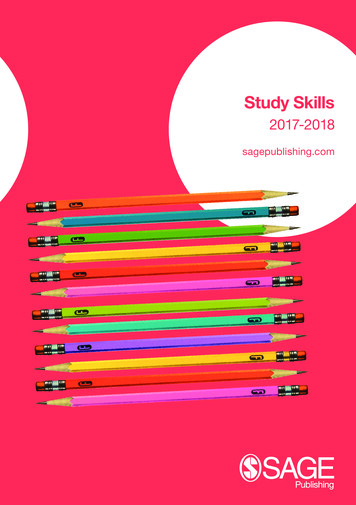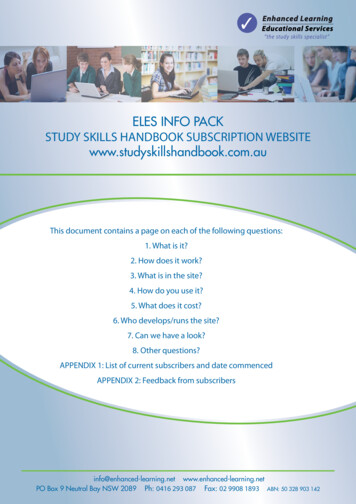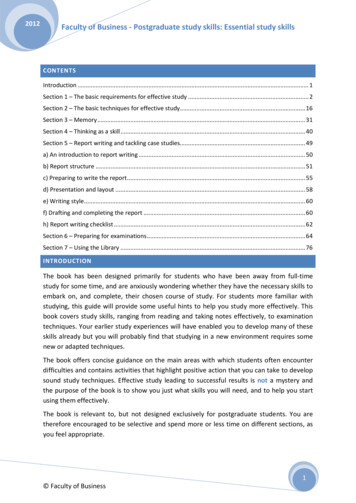
Transcription
2012Faculty of Business - Postgraduate study skills: Essential study skillsCONTENTSIntroduction . 1Section 1 – The basic requirements for effective study . 2Section 2 – The basic techniques for effective study. 16Section 3 – Memory . 31Section 4 – Thinking as a skill . 40Section 5 – Report writing and tackling case studies. 49a) An introduction to report writing . 50b) Report structure . 51c) Preparing to write the report . 55d) Presentation and layout . 58e) Writing style . 60f) Drafting and completing the report . 60h) Report writing checklist . 62Section 6 – Preparing for examinations . 64Section 7 – Using the Library . 76INTRODUCTIONThe book has been designed primarily for students who have been away from full-timestudy for some time, and are anxiously wondering whether they have the necessary skills toembark on, and complete, their chosen course of study. For students more familiar withstudying, this guide will provide some useful hints to help you study more effectively. Thisbook covers study skills, ranging from reading and taking notes effectively, to examinationtechniques. Your earlier study experiences will have enabled you to develop many of theseskills already but you will probably find that studying in a new environment requires somenew or adapted techniques.The book offers concise guidance on the main areas with which students often encounterdifficulties and contains activities that highlight positive action that you can take to developsound study techniques. Effective study leading to successful results is not a mystery andthe purpose of the book is to show you just what skills you will need, and to help you startusing them effectively.The book is relevant to, but not designed exclusively for postgraduate students. You aretherefore encouraged to be selective and spend more or less time on different sections, asyou feel appropriate. Faculty of Business1
2012Faculty of Business - Postgraduate study skills: Essential study skillsNOTEIf you are to get full value from this course of study it is very important that you take anactive part. Have pen and paper ready. As you read through the book, you will come to anumber of boxes marked Activity or Think Point. Each contains a question or exercise.Cover the print below the box and keep it covered while you attempt a written answer.When you have made a determined effort to set your thoughts down in writing, uncover thediscussion that follows and read on.A mock assignment is at the end of Lesson 2. Many students are nervous about tacklingwritten assignments so you are recommended to try your hand at this to help refresh yourwriting skills.Before starting Section 1, it would help if you have ready:1) A note-pad and pen for doing the exercises2) A calendar with room to make entries against each day3) A notebook or desk diary.SECTION 1 – THE BASIC REQUIREMENTS FOR EFFECTIVE STUDYIf the first thing to say about studying is that it is hard work, the second thing to say about itis that it can be among the most enjoyable and rewarding experiences of your life. The twothings are closely connected: the more you put into your study time, the more you will getout of it. Isn’t the truth of this confirmed when you think back, for instance, to your earlyschool experiences: weren’t those lessons you enjoyed the most those in which youconcentrated the most and worked the hardest? A sense of achievement is an importantresult and stimulus of study, and I hope you will gain such a sense through your course ofstudies. The purpose of the Essential Study Skills course is to help this to come about byimproving your study methods. Feeling confident about how you study is the important firststep to achieving your study objectives and ensuring that studying is a positive experiencefor you. Faculty of Business2
2012Faculty of Business - Postgraduate study skills: Essential study skillsOf course, one of the main requirements of effective study is the profitable use of time.Learning what not to read can often be as important as learning what to read, a point thatapplies also to your use of this course. The various ideas that are introduced in the differentsections have been shown, by research and general experience, to be useful in the greatmajority of cases, and so each section aims to develop your study skills in these areas.However, you must not feel that you need to work through parts of the course that youconsider to be unnecessary, irrelevant or unsuitable for you. Again, do not be afraid to‘skim’ parts of it in your search for the main points of introduction. Though most of thiscourse will undoubtedly be of the utmost value for your own effective study, parts of itmight not be, and it would be counterproductive to spend too much time on these.Effective studying demands that you have clear and definite answers in your mind to thefollowing questions: What aspects should I study? Where can I study most effectively? When can I study most effectively? How can I study most effectively? Why am I studying?You will find that Section 1 will concentrate on the questions beginning ‘what’, ‘where’,‘when’ and ‘why’; the other sections look at ‘how’ to study effectively. At the end of Section1 you will find summarised in diagram form the main pieces of advice offered throughoutthe course. The purpose of this summary is to give you an overall idea of what you will becovering, in a form suitable for planning and revision. It would be very useful for you to havea look at this summary now, but do not be concerned at this stage if parts of the diagramare not clear to you. More extensive explanations and information will be given in the restof the course!By way of introduction to the remainder of the section, try the following exercise:ACTIVITY 1What do you anticipate as being your main study problems in the following areas? Finding the time for study Finding a suitable place Creating the appropriate attitude Dealing with the work. Faculty of Business3
2012Faculty of Business - Postgraduate study skills: Essential study skillsWrite very brief notes on these topics (take about ten minutes). Then put them on one side,and reread them at the end of the section. By then, you should have more idea about howto solve these potential difficulties.For most students’, excitement about beginning a course of study using the distancelearning mode is mixed with understandable anxieties. A path of action has been decidedthat will disrupt the familiar pattern of your life. It is also possible that your only previousexperience of study may have been within the formal structure of a school but others willhave studied on a full-time course of higher-level study delivered primarily on a face-to-facebasis. It is thus no surprise that you could be wondering how well you would be able to copewith the demands of that unknown quantity, independent study.However, be determined to persevere and succeed! And take heart from the fact that manypeople in your situation have succeeded wonderfully well in the past.Next we will examine some of the major sources of anxiety for new students, and how tocope with these.EFFORTBecause studying takes place at a desk, it is easy to underestimate the effort, concentrationand determination you have to summon up and sustain if you are going to learn effectively.To combine a course of study with a full-time job, it is particularly important that yourecognise, and allow for, this first condition of learning. Studying effectively requirescommitment and energy.TIMEStudying effectively takes time. No matter how busy your life, time must be found and keptspecifically for study. Moreover, the mature student, studying at home, must bear in mindthat a new demand on his or her time almost always affects other people, whileremembering that studying effectively requires the consistent allocation of sufficient time.Since time and effort are the basic conditions for effective study, they are also the source ofmost of our initial anxiety. Do I have enough time for this new commitment? Can I find theenergy and determination needed? We will look carefully at these questions in this section.By finding some possible answers to them, you can banish much needless anxiety. Faculty of Business4
2012Faculty of Business - Postgraduate study skills: Essential study skillsFINDING THE DETERMINATION AND ENERGYAlmost all our activities require significant amounts of energy. Sometimes we are only tooconscious of this; we have to will ourselves even to begin certain tasks, or find only tooquickly that our initial enthusiasm has ebbed away. Other activities make no such demands.We start on them unthinkingly, and carry them through with what seems to be ease. Whydo we find tackling some activities so much harder than others? What indeed is it aboutcertain actions that make them so easy to perform?A large part of the answer would seem to be that actions performed with the least apparenteffort are those that are a matter of habit and/or those that we want to do because we findthem enjoyable and in some way rewarding. Thus preparing an evening meal is likely todemand very little conscious effort if one or more of the following factors apply: We regularly prepare a meal at this time We are hungry We enjoy cooking.How can students apply these facts of psychology to their own circumstances? If gettingdown to study can become a habit, a regular part of everyday life and if studying canbecome enjoyable and rewarding, you may be well on the way to finding the energy anddetermination that this new activity requires.GETTING INTO THE HABIT OF STUDYINGWe are all creatures of habit; much of our behaviour is a more or less automatic response toa given situation or stimulus. So, for example, habitual smokers trying to break the habitfind to their dismay that at certain times (e.g. immediately after meals) and in certain places(e.g. the local pub) they cannot help reaching out for a cigarette; stimulus and response gohand-in-hand. The same rules apply when trying to acquire a desirable habit. Studying canbecome habitual if you establish a routine in which a regular time and a specific place areset aside and used for study day by day, until they become firmly associated with thedesired activity. When this happens study becomes an accepted part of life, and nervousenergy is no longer dissipated in planning study sessions that fail to materialise - or in selfreproach for wasted time. The problem is that acquiring a new habit requires a great deal ofself-discipline in the early stages.THE IMPORTANCE OF MOTIVATIONThe second type of actions that seem to come easily are those that we find rewarding andwant to do. Psychologists usually refer to the source of our energy, the drive that enables usto initiate action and carry it through, as motivation. Motives arise from our individualwants and needs. Psychologists distinguish between two kinds of motivation. Faculty of Business5
2012Faculty of Business - Postgraduate study skills: Essential study skillsEXTRINSIC MOTIVATIONExtrinsic motivation is produced by a need or wish for something that can only be obtainedby carrying out a particular set of actions. For example, the nourishment that will satisfyhunger as a result of preparing a meal; or the pay packet that will reward a week of hard,perhaps uncongenial, work.INTRINSIC MOTIVATIONIntrinsic motivation is aroused by the satisfaction inherent in an activity, irrespective ofoutside reward; for example, the enjoyment experienced when cooking an imaginativemeal, or the sense of achievement gained from work skilfully performed.ACTIVITY 2Before reading any further, write down all your reasons for starting on, or preparing for,your course of study. Think hard about this; you may find some that you have notconsciously thought about before. It is important that you become fully aware of yourreasons for studying, because these motives - and you will find that they all stem from awish or need - are quite literally the sources of the nervous energy you will require to carryyour project through. Make a list and then see if you can categorise each one as eitherextrinsic or intrinsic motivation. Talk to your family about your list of reasons. You needtheir co-operation and knowing your wishes and needs will deepen their understanding ofwhat you are attempting to do.SOME LIKELY REASONS FOR STUDY A desire to know more about the subject A wish to stimulate and improve mental ability A longing to widen one’s horizons.These are examples of intrinsic motivation. They involve recognising that study can beenjoyable, and the source of its own reward.A desire to pass an examination in order to: Obtain a qualification Fulfil personal ambition Improve career prospects.These are examples of extrinsic motivation. They are directed outwards, towards a rewardthat can be gained as a result of study. Sometimes called vocational needs, they includeperhaps the commonest and most important reasons for studying. Faculty of Business6
2012Faculty of Business - Postgraduate study skills: Essential study skillsINTEREST AND ENJOYMENTWhen you find a subject absorbing and enjoyable it is easier to study and learn. Moreover,our interest in and enjoyment of the subject increases if we reflect upon its relevance in oureveryday lives. So you should avoid restricting your subject to a separate little compartmentof your life. Instead, try and integrate the interest into your life as a whole.Family, friends and work colleagues are less likely to resent this new demand on your time ifyou talk to them about it and involve them in what you are doing. Making the subjectinteresting for them will clarify your own ideas and help you to learn and remember. Lookconsciously for connections between what you are doing and what you are learning. Watchout for television and radio programmes, or local meetings and events, which are relevantto your subject. Read a quality newspaper with your subject in mind, and wherever possible,link your study to situations that are occurring in the world. Read relevant book reviews;browse in the library or a bookshop and discover a book for yourself that will help to bringthe subject to life. If you do this you will see possible connections between it and your workand everyday life, and the more your knowledge and ability to learn will increase. Moreover,when you settle down to study your textbooks, you are far less likely to have to struggle toconcentrate your mind, because now your brain is already ‘set’ and alert for the subject.LONG AND SHORT TERM GOALSIt is likely that you are embarking on this course of study because you wish to gain aparticular qualification. We might call this your long-term goal. But at this stage in yourstudies the qualification is too far in the future to be a really effective motivating force andsource of energy. For that you need a cumulative series of short-term attainable goals thatwill take you steadily towards realising your overall aim. In some courses of study, modulecertificates awarded as you pass each individual subject may help you here.1) Plan to complete the specified sections of a module a good week before you arerequired to submit coursework, so that you have plenty of time to prepare it2) Mark the coursework deadlines given in your programme of study very clearly on acalendar (the sort that has enough room to make entries against each day is best)3) Concentrate on the first completion date - this will be your first short-term goal. If youcomplete your first assignment on time, you will be safely on the way to your overallaim. If you are thinking of taking a trip or making a purchase, time it to occur aftersubmitting coursework, as something to look forward to and as a reward for the hardwork that has gone into achieving your first short-term goal4) Note examination dates on your calendar too where relevant. If possible plan tocomplete examined modules and submit the assignments well before the cut-off dates,so that you can get feedback in good time to guide your revision and exam preparation. Faculty of Business7
2012Faculty of Business - Postgraduate study skills: Essential study skillsA study plan of this kind is of the utmost value. It provides a structure for your activity andan immediate focus for your effort. As each deadline is met and crossed from your calendar,the achievement and the knowledge that you are one step nearer your overall aim willboost your energy and determination to succeed.FINDING THE TIMEYou will have unique educational needs and circumstances. Whatever these may be, it islikely that your new study commitments mean that you are faced with the problem ofaccommodating them within the requirements of a busy life. An important part of planningis to decide what your priorities are and ensure that you have time to carry them out. Inorder to make time for your priorities, it is important to think about your preferred way ofworking. This includes understanding your own habits and characteristics as well asidentifying the time of day when you are most productive/least likely to be interrupted/fallasleep or be tempted to do something else. Very few people are so highly organised thatevery moment is used to full advantage and, bearing this in mind, it is well worthwhiletaking a long, cool look at how exactly your days are spent.ACTIVITY 3Record a week’s activity on the timetable provided on the next page, including workinghours, travelling time, time spent watching television, time spent with the family, etc.Once you are aware of how you spend your time at present, you will find it easier to planyour time more effectively to ensure priorities are met.You may quite quickly begin to see a pattern emerging of time that is fully utilised, and timethat is relatively free. If this is not the case, consider whether it is possible to shuffle andrearrange various activities, in order to leave some spare usable space. At the same time, tryto think very carefully about the value you place on the activities that fill your days.Remember that you want to study in order to achieve your goals, and as a consequencestudying must necessarily be given a fairly high degree of priority in the pattern of your life. Faculty of Business8
2012Faculty of Business - Postgraduate study skills: Essential study 12.00 pm9.00pm10.00pm11.00pm12.00pm Faculty of ay
2012Faculty of Business - Postgraduate study skills: Essential study skillsACTIVITY 4If you have been working at this text for longer than 45 minutes, take a break of fiveminutes now!RELAXATION AND FLEXIBILITYBeing realistic about the time you have available involves allowing time for relaxation andalso means building a degree of flexibility into your plans. Everyone needs time just to relax,and family and friends are more likely to understand your overall endeavours if they seethat you are saving more time to enjoy their company. With this in mind it is a good idea,wherever possible, to plan one day a week completely free of study.This practice will also enable you to build flexibility into your timetable. There will be someoccasions when the best-made plans must give way before unexpected occurrences. Youmay feel unwell, or relatives may arrive without warning, or you may be invited to a partytoo good to miss. It is important at such times not to submit to too much heart-searchingand feelings of guilt. It is equally important that your carefully planned timetable is not justdisregarded and allowed to fall by the wayside. Both these extremes may be avoided bytrading a few hours of your free day for the missed study period. The result of this flexibilityis that at the end of the week study objectives will have been achieved without incurring thenegative feelings of resentment that allocating your time too rigidly can inflict.A word should be said here about sleep. There is no doubt that if your brain is to remainactive, and if your health is not to suffer, a full quota of sleep is essential.Nevertheless, you can experiment with organising your study time around your sleepinghabits, so that you work when you feel more alert. For many people, for instance, earlymorning work, though a difficult habit to introduce, is a most effective way of studying.SPARE MOMENT STUDYINGI have said that 45 minutes is the shortest effective study period, and for concentrated studythat maxim holds. Nevertheless, in addition to your regular scheduled sessions, it is a goodidea to get into the habit of making use of odd moments for other purposes. Every subjectincludes a certain amount of rote learning, formulae to be committed to memory,definitions to be remembered. Try keeping a small note-pad in your pocket, and, if you findyourself waiting at the bus stop, or at the dentist, or in the canteen, use it to jot down oneor two of these from memory. You might also find it useful to carry a textbook to glance atduring the odd spare moment.Travel time can be used also. A train journey permits useful study if you remember to takethe necessary study notes and related textbooks with you. Or you can check out conceptsand arguments mentally to see how much you’ve retained from a study session. Faculty of Business10
2012Faculty of Business - Postgraduate study skills: Essential study skillsThese brief intervals certainly cannot take the place of regular periods of concentratedstudy, but they are useful supplements and a way of keeping the brain constantly ‘set’ forinformation relating to your subject.ACTIVITY 5Look again at your timetable of a week’s activities. In the light of all that has been said,allocate study periods for the week. You might enjoy drawing up a full timetable for thispurpose, or like me, you may prefer to mark the times very clearly on your day-to-day studycalendar. At this point, allocation of study periods and your overall plan should be broughttogether, the calendar clearly showing when you will study, together with your studyobjective - perhaps two sections, one from each of your current modules.Regard the coming two weeks as a period of experimentation. Be as determined as youpossibly can to observe the study commitments you have made, but at the end of afortnight make a realistic appraisal of how well the plan has worked. Make any adjustmentsthat seem sensible, perhaps adding an hour, perhaps taking one away, and look upon thefinal result as time definitely allocated to study, at least until your first short-term goal isreached. Only deviate from your plan within the flexibility you have allowed. In the case of amajor mishap, however, such as illness, you will need to rethink your plan, and would bewell advised to seek the guidance of your Oxford Brookes University Programme Director orCourse Manager.OTHER PEOPLEOnce you have established the number of weekly hours to be devoted to study and havescheduled these into your daily life, it is very important that you acquaint family and friendswith your plans. Telling other people of your good intentions helps to keep you to yourchosen path, since the possibility of losing face by admitting to a lack of resolve andwillpower is something that most of us strive to avoid. The second reason why others shouldbe kept in the picture is because study hours must become periods when you can expect tobe left undisturbed. This is particularly difficult for the home student. Individuals, whowould not dream of breaking into a classroom or lecture hall, would cheerfully demand theattention of someone who is sitting quietly studying. Friends should be tactfully asked not tocall at study times, either in person or by telephone, while the family should be asked to tryto act, as far as possible, as if you were not in the house. Faculty of Business11
2012Faculty of Business - Postgraduate study skills: Essential study skillsThe price of trying to cope alone with study decisions and of being secretive about yourplans is that your study periods will inevitably be interrupted and there is then a tendencyto react in one of two ways, both equally damaging. You may welcome the interruption as aheaven-sent excuse for relaxation and avoiding the hard demands that you have setyourself. Or, conversely, you may lose your temper, shout at the intruder and then wastethe rest of the study period feeling selfish and guilty.SUMMARY1) Look closely at the way you spend your time and make some firm decisions about yourpriorities2) Underestimate rather than overestimate time available3) Not keeping to a plan is worse than not having one4) Spread work evenly over each week5) Shortest effective study period 45 minutes. Longest 3 hours6) Take short breaks every 40-45 minutes7) Allow time for relaxation and flexibility8) Be flexible9) Make use of spare moments and travel time10) Experiment with your timetable before making final allocations of time11) Once decisions have been made, tell other people, and then keep to them.WHERE TO STUDYYou may feel that you have little choice in the matter of where to study and the ‘idealconditions’ sometimes prescribed in study handbooks represent for many students no morethan an impossible dream. Nevertheless, much can be done with an imperfect studyenvironment if we give the matter a little thought and apply some straightforward thinkingto those aspects that are under our control.The first necessity is a firm, upright chair and a table large enough to accommodate booksand papers. Get into the habit of regarding the chair and table as your study corner. If youcan keep it exclusively for that purpose, so much the better, since the place will thenbecome associated with the activity in your mind and the mind of your household. Forconvenience, moreover, it will be the place where your study material will be at hand. Faculty of Business12
2012Faculty of Business - Postgraduate study skills: Essential study skillsStock your table with all the things you require, such as essential textbooks, ruled paper (A4is the most convenient size), scrap-pad, highlighters, pens, pencils, eraser, ruler, ringbinders, all correspondence with Oxford Brookes University and so forth. Make a rule thatthe area is to be respected by the rest of the household and that nothing is to be touched orremoved. If the table is required for other purposes and has to be cleared at the end ofevery session, you can keep everything together in a drawer or box. Have your studycalendar prominently displayed above the table, where it will act as a constant reminder ofstudy times and objectives.LIGHTING AND TEMPERATUREPoor illumination can affect your working efficiency and cause eyestrain and headaches. Asmany of you will be studying in the evenings when artificial lighting is essential, you shouldaim for adequate well-distributed illumination, free as far as possible from glare. This is bestattained by a combination of indirect light and a desk or standard lamp angled directly overthe working area. It is also important to be neither too hot nor too cold. Remember that youwill be sitting still for a considerable length of time so pay attention to possible sources ofdraught and wear plenty of layers of clothing so that quick adjustments can be made asappropriate. A stuffy ill-ventilated room also affects your ability to remain alert and youshould act quickly to guard against this.DISTRACTIONSA place of study is best free from distractions. You cannot concentrate fully on a task if yourmind is being intermittently drawn to other sights and sounds. On the other hand most of usare probably conditioned to a degree of noise, and absolute silence may itself be disturbing,encouraging the mind to wander in search of the accustomed stimulus. This may be why somany students claim to work best to a background of familiar music. There may also betimes when undemanding music can effectively mask more enticing sounds, such as peopletalking out of full range.The answer once more seems to be: be flexible and experiment. Individuals do differ andthe important thing is to discover the conditions most conducive to your particular turn ofmind. I have known students who found it difficult to concentrate in what appeared to beideal study facilities. Paradox
The purpose of the Essential Study Skills course is to help this to come about by improving your study methods. Feeling confident abouthow you study is the important first step to achieving your study objectives and ensuring that studying is a positive experience for you.
